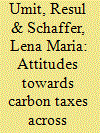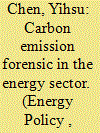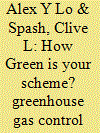|
|
|
Sort Order |
|
|
|
Items / Page
|
|
|
|
|
|
|
| Srl | Item |
| 1 |
ID:
176744


|
|
|
|
|
| Summary/Abstract |
While using carbon taxes to reduce greenhouse gas emissions may well be effective, this has recently proved too unpopular to put into practice in a number of countries. Yet, at a time when governments across the world are preparing their nationally determined contributions to the Paris Agreement, our knowledge of whether and why people oppose these taxes originates from a single or small number of cases. Drawing on the European Social Survey (n = 44,387), this article provides evidence on public attitudes towards increasing taxes on fossil fuels to reduce climate change from 23 countries, most of which have never featured in the literature before. The results point to a widespread aversion to carbon taxes. On the one hand, this worsens with the perceived costs of taxes, such as the case among consumers who depend highly on energy. On the other, it improves with political trust and external political efficacy—factors that help ease the uncertainty around policy proposals. Our estimations suggest that the effect of changes in these factors alone would be large enough to reverse the public resistance to carbon taxes in some countries. These results are robust to a number of alternative specifications and various checks.
|
|
|
|
|
|
|
|
|
|
|
|
|
|
|
|
| 2 |
ID:
166386


|
|
|
|
|
| Summary/Abstract |
Climate policy has mostly focused on regulating power suppliers. There is a growing interest in exploring regulating emissions from the demand side by incentivizing consumers to reduce their energy consumptions, or to purchase power from cleaner sources through tracking carbon content of power flow in the transmission network. This paper analyzes market outcomes under two approaches: producer-based and demand-based carbon taxes. We formulate each approach as a market equilibrium model. For the consumer-based approach, the analysis assumes that a utility, procuring electricity on behalf of consumers, is subject to the carbon tax. For the producer-based approach, the producers are subject to the carbon tax, and therefore, pay for their emissions. We show that the two approaches are equivalent when the program's coverage is complete. However, when the coverage is incomplete, the consumer-based carbon tax is less effective in pricing carbon emissions owing to the fact that sales to unregulated regions are not subject to the carbon tax. Given that the transaction cost of implementing consumer-based tax is likely to be high, benefit of tracking power flows in order to estimate carbon content or footprint might not be justified even with a full coverage program.
|
|
|
|
|
|
|
|
|
|
|
|
|
|
|
|
| 3 |
ID:
186443


|
|
|
|
|
| Summary/Abstract |
Carbon prices and carbon caps need to be set at levels that will deliver the reduction targets necessary to keep global warming under 2 °C, aspiring to 1.5 °C above pre-industrial levels, in line with the Paris Agreement. Given both the urgency of the situation and the heterogeneity across countries and sectors, switching caps and switching prices may be the answer.
|
|
|
|
|
|
|
|
|
|
|
|
|
|
|
|
| 4 |
ID:
116702


|
|
|
|
|
| Publication |
2012.
|
| Summary/Abstract |
Australia managed to pass a national carbon pricing scheme into legislation in November 2011, which has come into effect from July 2012. The scheme includes elements of a CO2-equivalent tax as a short prelude to emission trading. Several fundamental problems remain unaddressed, including: the continuing rise of emissions, the scale of growth and economic activity, the promotion of emission trading, subsidies to polluters, the hidden promotion of banking and finance sectors. The new policy appears primarily targeted at job creation and business as usual. We argue that the prospects for any meaningful reduction in emission levels are extremely unlikely.
|
|
|
|
|
|
|
|
|
|
|
|
|
|
|
|
| 5 |
ID:
082904


|
|
|
|
|
| Publication |
2008.
|
| Summary/Abstract |
This study investigates the potential impact of a carbon tax on the economy of the Philippines and on the livelihood of its people. It focuses on the interaction between such a tax and the country's ongoing trade liberalization programme. With energy use on the rise in the Philippines, increases in greenhouse gas emissions are almost inevitable. The policy most widely recommended by economists -a carbon tax -may be an efficient way to deal with the problem, but there is concern about its distributional effects. The study finds that a carbon tax would compensate for any tariff revenues lost through a reduction in trade tariffs. It also finds that the tax would reduce poverty and increase people's welfare. Imposing a carbon tax during the ongoing trade liberalization process -provided the carbon tax is used to reduce income taxes -is a sensible approach that could meet the country's economic, environmental and equity objectives.
|
|
|
|
|
|
|
|
|
|
|
|
|
|
|
|
|
|
|
|
|